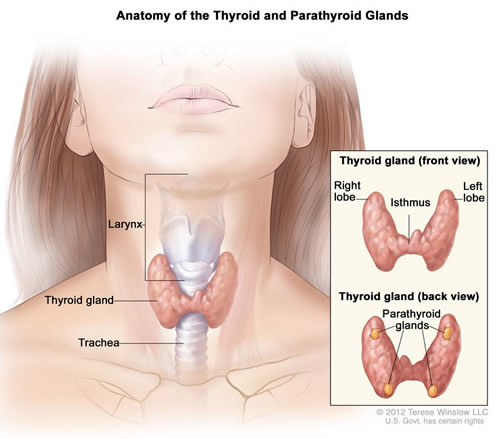About Thyroid Cancer

Thyroid cancer is a rare cancer, commonly diagnosed at a younger age than most other adult cancers. Nearly 2 out of 3 cases are found in people younger than 55 years of age. About 2% of thyroid cancers occur in children and teens. According to the American Cancer Society’s most recent estimates there will be about 63,000 new cases diagnosed this year. This compares to the estimated 221,200 cases of lung cancer.
In most cases, thyroid cancer can be treated, most often with surgery, but sometimes the treatment is radioactive iodine. In general, the most common types of thyroid cancer are very treatable and have excellent long-term prognoses. It is very rare to die from thyroid cancer. Rates of thyroid cancer have increased over the past several years and U-M physicians serve on committees that develop national guidelines for care.
The Thyroid Gland
In order to understand this cancer, it's helpful to understand the thyroid gland and its purpose. The thyroid gland is butterfly-shaped and is located in the lower-front portion of the neck. The purpose of this gland is to produce hormones which are then secreted into the blood. Once in the bloodstream, these hormones are used to help the body function by powering the heart, brain and other organs.
On rare occasions, the thyroid tissue grows more than it should, producing nodules. Thyroid nodules can be non-cancerous (benign) or cancerous (malignant). Thyroid cancer is found in just 5% of all thyroid nodules.
Types of thyroid cancer:
Papillary carcinoma:
About 8 of 10 thyroid cancers are papillary carcinomas (also called papillary cancers or papillary adenocarcinomas). Papillary carcinomas tend
to grow very slowly and usually develop in only one lobe of the thyroid gland. Even though they grow slowly, papillary carcinomas often spread
to the lymph nodes in the neck. Still, these cancers can often be treated successfully and are rarely fatal.
Follicular carcinoma:
Follicular carcinoma, also called follicular cancer or follicular adenocarcinoma, is the next most common type, making up about 1 out of 10
thyroid cancers. It is more common in countries where people don't get enough iodine in their diet. These cancers usually do not spread to
lymph nodes, but they can spread to other parts of the body, such as the lungs or bones. The prognosis (outlook) for follicular carcinoma
is not quite as good as that of papillary carcinoma, although it is still very good in most cases.
Hürthle cell carcinoma:
Also known as oxyphil cell carcinoma - is actually a variant of follicular carcinoma. It accounts for about 3% of thyroid cancers. The
prognosis may not be as good as that of typical follicular carcinoma because this type is harder to find and treat. This is because it
is less likely to absorb radioactive iodine, which is used both for treatment and to look for the spread of differentiated thyroid cancer.
Medullary thyroid carcinoma:
Medullary thyroid carcinoma (MTC) accounts for about 4% of thyroid cancers. It develops from the C cells of the thyroid gland, which normally
make calcitonin, a hormone that helps control the amount of calcium in blood. Sometimes this cancer can spread to lymph nodes, the lungs, or
liver even before a thyroid nodule is discovered.
Anaplastic carcinoma:
Anaplastic carcinoma (also called undifferentiated carcinoma) is a rare form of thyroid cancer, making up about 2% of all thyroid cancers. It
is thought to sometimes develop from an existing papillary or follicular cancer. This cancer is called undifferentiated because the cancer
cells do not look very much like normal thyroid cells under the microscope. This cancer often spreads quickly into the neck and to other
parts of the body, and is very hard to treat.
Thyroid lymphoma:
Lymphoma is very uncommon in the thyroid gland. Lymphomas are cancers that develop from lymphocytes, the main cell type of the immune system.
Most lymphocytes are found in lymph nodes, which are pea-sized collections of immune cells scattered throughout the body (including the thyroid
gland).
Thyroid sarcoma:
These rare cancers start in the supporting cells of the thyroid. They are often aggressive and hard to treat.
Continue to learn about thyroid cancer
